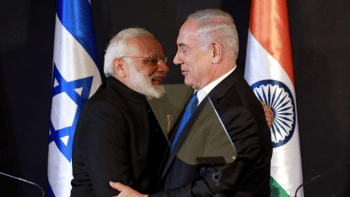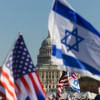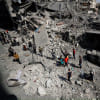Consistently inconsistent: The US’ credibility hangs in the balance

The US, despite its arsenal of analysts, strategists, and policymakers, frequently has to reverse its foreign policy decisions. Time and again we have observed this phenomenon, with the US having to enforce the Reverse Course policy on its Cold War ally Japan in the late 1940s, pulling out of Afghanistan after 20 years of warfare with little to show for it, and imposing US visa sanctions on those "undermining democracy" prior to the January 7 Bangladesh election. Now, we're seeing the same in the US' paradoxical handling of Palestine. There seems to be a trend. Washington touts human rights, democracy, and peace, but only if achieving these doesn't clash with its main priorities: economics and security.
In the case of Bangladesh, the country is used to the US being vocal about human rights and democratic norms, alongside the occasional chastisement regarding labour laws and unfair elections. However, the recent political climate shows that the US, despite not being happy with the way elections were conducted, remains persistent in pursuing deeper ties with Bangladesh on the economic, geostrategic, and development fronts. The US Press Spokesperson Matthew Miller, despite stating that the January 7 election lacked fairness, emphasised the US' dedication to collaborating with Bangladesh in advancing a joint vision for a free and open Indo-Pacific, supporting human rights and civil society in Bangladesh, and strengthening economic connections. On top of that, US President Joe Biden sent a letter to Prime Minister Sheikh Hasina on February 6 expressing his administration's desire to work with her on numerous fronts, including "global security, economic development, climate change and energy, global health, humanitarian support." The unseasoned eye would suffer from whiplash from the rate at which the US went from an attempt to strong-arm the Bangladeshi government to abide by the US rulebook for elections, to sweeping it all under the rug afterwards. Still, if we look at the US' track record, we can see that its behaviour remains consistently inconsistent and is thus somewhat predictable.
If the US continues to engage in actions which destabilise and undermine the international rules-based order by supporting the egregious crimes of Israel, while at the same time preaching about human rights and noble ideals like fairness, freedom, and inclusivity in Bangladesh and elsewhere, not only is the US shooting itself in the foot by eroding its own credibility, but it also faces the risk of increased isolation on the world stage.
In the past, the US sermonising about human rights was rarely digestible. But these days, it is met with waves of incredulity and ridicule in Dhaka and abroad in light of its actions in the Middle East. Washington claims itself as the champion of human rights and democracy globally, but there is growing apprehension that its reputation may have suffered irreparable damage this time around. The US' actions, including repeatedly vetoing ceasefire resolutions for Gaza in the UN Security Council, leading coalition attacks against the Houthi in the Red Sea, rejecting the South African case at the ICJ accusing Israel of genocide, and maintaining unwavering strategic, financial, military, and diplomatic support for Israel, collectively undermine its calls for upholding human rights, international law, and democratic principles in Bangladesh and beyond. The US has sold weapons worth more than $573.5 million to Israel since October 7, and this is just the amount that was made public. And now, Washington is busy reversing its approach to Gaza, with Biden shoddily airdropping aid and creating a makeshift emergency port to deliver humanitarian assistance in a crisis he continues to fund. Unfortunately, these efforts cannot undo the deaths of thousands of Palestinians and they certainly cannot undo the damage the US' image suffered as a result of supporting Netanyahu's repressive Israel in committing genocide against the Palestinians. Simply reversing its strategy at the last minute, before the elections, does not give the US a free pass to support criminals such as Netanyahu and continue business as usual.
Even in South Asia, the US is inconsistent in its advocacy of democracy, particularly in India, Pakistan, and Bangladesh. In the case of India, Washington often overlooks evident instances of Hindu nationalism and related human rights violations, prioritising the US-India geostrategic partnership aimed at containing China's influence in the region. Conversely, in Pakistan, while the US calls for the restoration of democracy, it maintains a relatively soft and accommodating stance, favouring cooperation with military dictatorships rather than elected officials who may want to exit the US orbit. This approach sharply contrasts with the specific actions taken by Washington to support democracy in Bangladesh, which included visa sanctions imposed on individuals undermining the organising of free and fair elections. Despite this attempt at pressuring the ruling party in Bangladesh, the US shifted gears post-election so as not to disturb New Delhi's strategic ally and perturb the geopolitical waters to the point that Dhaka tilts too much towards Beijing or Moscow during turbulent times. These cases exemplify that US foreign policy remains inconsistent in pushing for democratic norms, but it does remain consistent in prioritising strategic interests above all.
If the US continues to engage in actions which destabilise and undermine the international rules-based order by supporting the egregious crimes of Israel, while at the same time preaching about human rights and noble ideals like fairness, freedom, and inclusivity in Bangladesh and elsewhere, not only is the US shooting itself in the foot by eroding its own credibility, but it also faces the risk of increased isolation on the world stage. This, in the long run, will subsequently encourage other states to challenge US hegemony. Washington must draw practical red lines with Israel instead of throwing around tepid criticisms laced with double standards. The world is watching closely and the time for lip service is over. For the sake of its own national interests, the US must now do its part, as a great power, to reverse the damage it has done in clear, concrete, and consistent terms.
Afia Ibnat is a political analyst and executive member of Shorolota Foundation. She can be reached at [email protected]
Views expressed in this article are the author's own.
Follow The Daily Star Opinion on Facebook for the latest opinions, commentaries and analyses by experts and professionals. To contribute your article or letter to The Daily Star Opinion, see our guidelines for submission.

 For all latest news, follow The Daily Star's Google News channel.
For all latest news, follow The Daily Star's Google News channel. 









Comments